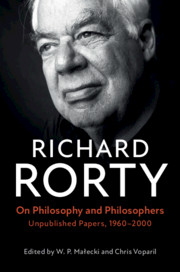Book contents
- On Philosophy and Philosophers
- On Philosophy and Philosophers
- Copyright page
- Contents
- Acknowledgments
- Note on Sources
- Introduction: Rorty as a Critical Philosopher
- I Early Papers
- 1 Philosophy as Ethics
- 2 Philosophy as Spectatorship and Participation
- 3 Kant as a Critical Philosopher
- 4 The Paradox of Definitism
- 5 Reductionism
- 6 Phenomenology, Linguistic Analysis, and Cartesianism: Comments on Ricoeur
- 7 The Incommunicability of “Felt Qualities”
- 8 Kripke on Mind-Body Identity
- II Later Papers
- Index of Names
7 - The Incommunicability of “Felt Qualities”
from I - Early Papers
Published online by Cambridge University Press: 10 October 2020
- On Philosophy and Philosophers
- On Philosophy and Philosophers
- Copyright page
- Contents
- Acknowledgments
- Note on Sources
- Introduction: Rorty as a Critical Philosopher
- I Early Papers
- 1 Philosophy as Ethics
- 2 Philosophy as Spectatorship and Participation
- 3 Kant as a Critical Philosopher
- 4 The Paradox of Definitism
- 5 Reductionism
- 6 Phenomenology, Linguistic Analysis, and Cartesianism: Comments on Ricoeur
- 7 The Incommunicability of “Felt Qualities”
- 8 Kripke on Mind-Body Identity
- II Later Papers
- Index of Names
Summary
“The Incommunicability of ‘Felt Qualities’” focuses on the claim that has been at the center of many debates generated by Wittgenstein’s “Philosophical Investigations“: that “we cannot communicate certain qualities” – for example, the special felt qualities of toothache – to others. Rorty suggests that philosophers have been making too much of that claim. Instead, he argues that it is true only in a “philosophically innocuous” sense – we can never be sure whether we mean or know the same thing in describing ‘X’ – and false when it becomes philosophically interesting, since using the noun toothache correctly in relevant circumstances denotes knowledge of the term, even if the felt qualities of a toothache were never experienced. By focusing on language use, Rorty alleviates the philosophical controversy and the threat of epistemological skepticism, concluding that we need deny “neither the existence of a perfectly good sense of ‘know’ in which there can be prelinguistic or nonlinguistic knowledge (or “awareness” or “consciousness”), nor the existence of unsharable mental particulars to which we have privileged access.”
- Type
- Chapter
- Information
- On Philosophy and PhilosophersUnpublished Papers, 1960–2000, pp. 115 - 122Publisher: Cambridge University PressPrint publication year: 2020

